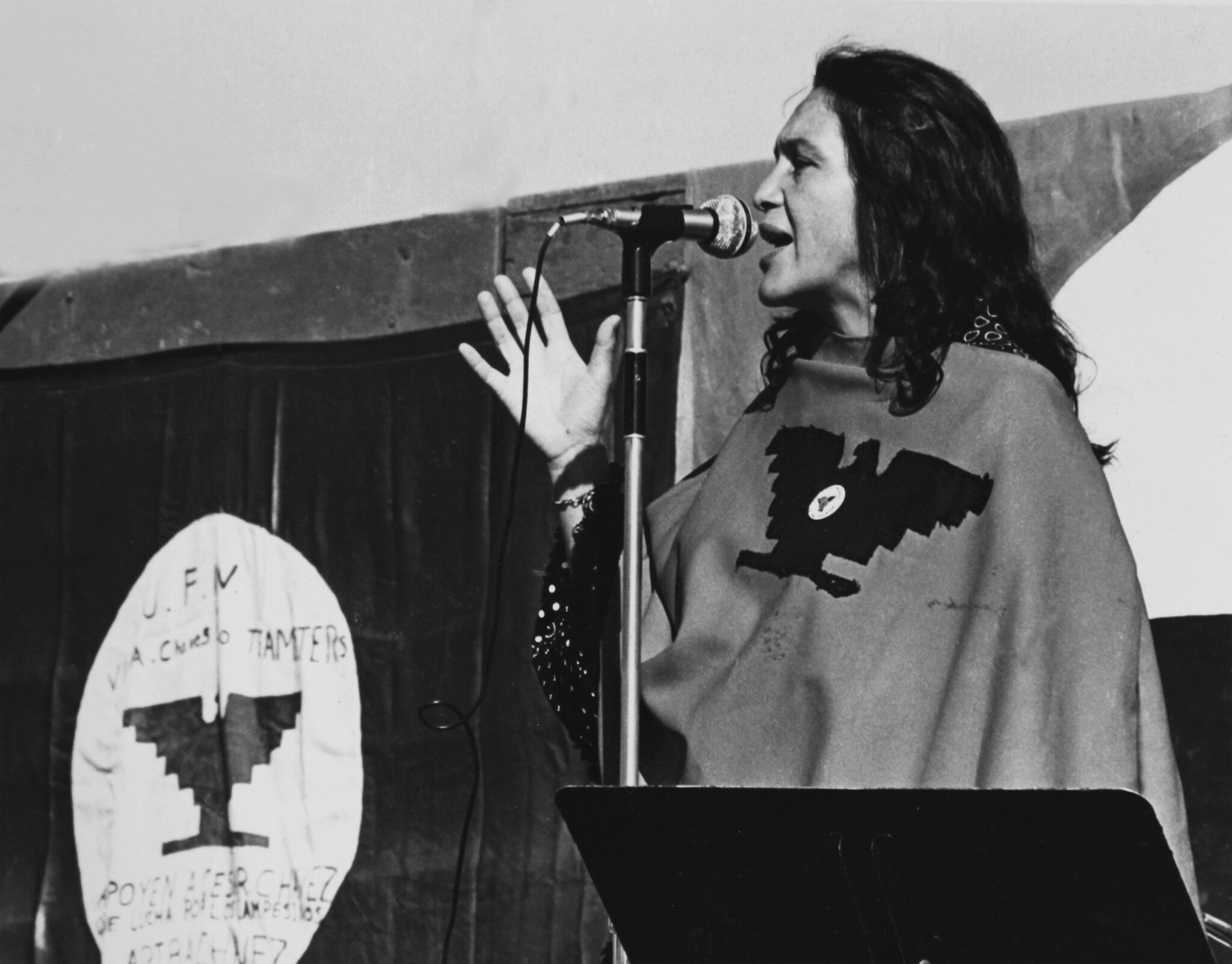IN THE ORCHARD OF DOLORES HUERTA
DELANO, CALIFORNIA — 1965 — Singing, marching, chanting “Viva La Huelga!,” two thousand farm workers picket the grape fields of California. Some have worked those fields for decades. Others are children earning 80 cents an hour. Will someone take up their cause?
Journalists focus on a single strike leader — Cesar Chavez. But right up front, speaking through a bullhorn, is his alter ego. Where he appears calm and Christlike, she seems lit by fire. When he ponders, she acts. Her “Yes, we can’’ often clashes with his “not yet.” But those who know Dolores Huerta know she is second to no one in the United Farm Workers.
Fate and marriage gave her the surname that means, in Spanish, “orchard.” Yet Dolores Clara Fernandez Huerta never picked fruit. Instead, she took up “la causa” in the name of children.
“A lot of the children were the children of farmworkers,” she recalled of teaching in California’s Central Valley. “And they would come to school with their raggedy shoes and their little bones sticking out of their T-shirts. And I thought that was so wrong. I thought I could do more by organizing farm workers than by trying to teach their hungry children."
The mid-1950s saw the peak of the labor movement, massive unions — United Auto Workers, United Steelworkers— earning Labor the respect and wages that created a solid middle class. But the million who picked fruit remained as Woody Guthrie had found them.
Is this the best way we can grow our good orchards?
Is the best way we can grow our good fruit?
To fall like dry leaves and rot on your topsoil,
And be known by no name except Deportee.
In 1955, though a single mother with seven children, Dolores Huerta left the classroom and went into the fields near Stockton, California. She met farm workers in their shacks, and later went to Sacramento to lobby for a $1.25 wage. In 1959, she met a kindred spirit. Chavez had heard of Huerta.
“She’s a real firebrand,” one organizer told him, “She’s smart, articulate, self-starting.” Soon Chavez and Huerta were working together. And fighting each other.
Their relationship, one historian noted, was “tempestuous from the start.” Arguments turned into shouting matches. Huerta stormed out, only to return the next day. Chavez had no love of “illegals” whom he thought hurt the cause of legal immigrants. Huerta’s orchard was big enough for both. “The people themselves aren’t illegal,” she said. Huerta bristled at Chavez’s self-importance. “The guy sounded like a messiah,” she said after one speech.
But together, the two formed the National Farmworkers Association in 1962. Three years later, renamed United Farm Workers, the union joined striking Filipino grape pickers in Delano. With Chavez on podiums and Huerta behind a bullhorn, they expanded the strike into a nationwide boycott of table grapes.
When Chavez, Huerta, and others walked 340 miles from Delano to Sacramento, Robert F. Kennedy joined the cause, befriending Huerta. Months later, on that June night when he thanked supporters in Los Angeles, she was with him as he walked into the hotel kitchen.
The UFW grape boycott continued until 1970 when Huerta helped negotiate the first contract between growers and pickers. As strike followed strike, Huerta devised a motto — Si, se puede. Yes, we can.
Huerta’s passion and tactical brilliance led to the California Agricultural Relations Act of 1975 that recognized the UFW. Yet she was only recognized on a national stage after Barack Obama took the words right out of her mouth.
“She was very gracious when I told her I had stolen her slogan, ‘Yes, We Can’,” the president said in 2012 when awarding Huerta the Presidential Medal of Freedom. “Knowing her, I’m pleased that she let me off easy. Because Dolores does not play.”
At 94, Huerta is still fighting, showing up at marches for minimum wage or in support of the Dream Act. A PBS documentary, “Dolores,” brought her story to millions. Her spirit lives on, not just in the Dolores Huerta Foundation but in her children — all eleven of them — organizing, lobbying, proving that we can.














